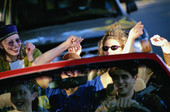
THURSDAY, Jan. 2, 2014 (HealthDay News) — Teen drivers quickly move from focused to distracted while behind the wheel, and this raises their risk for accidents, a new study finds.
Car crashes are the leading cause of death for U.S. teens, according to the U.S. Centers for Disease Control and Prevention. In 2010, more than 2,500 teens died in car crashes — seven deaths every day — and teen drivers are three times more likely than drivers aged 20 and older to be in fatal crashes.
The way to reduce that risk is simple: pay attention, said Dr. Karen Sheehan, medical director of injury prevention and research at Children’s Memorial Hospital in Chicago.
“This study confirms, especially for novice drivers, that we should all follow what the rock band the Doors recommended over 40 years ago in ‘Roadhouse Blues’: ‘Keep your eyes on the road and your hands upon the wheel,'” said Sheehan, who was not involved in the study.
Novice drivers also are not good at detecting potential hazards, said study author Charlie Klauer, leader of the Risk and Injury Prevention Group at Virginia Tech.
“They are just learning ways to handle and negotiate various traffic conditions,” Klauer said. “They are learning that looking away from the road increases their risk. When they engage in tasks that force them to take their eyes off the road, they are at increased risk of being involved in crashes.”
Klauer noted that these distracting tasks include texting, dialing cellphones, reaching for cellphones or other objects, eating, and looking at things that aren’t essential to driving, such as scenery.
The report was published Jan. 2 in the New England Journal of Medicine.
Driving laws that limit the times teens can drive and how many passengers they can have in the car are a step in the right direction, Klauer said, as are laws that limit cellphone use. Parents also need to counsel their children about eliminating distractions, she added.
Teens can be overconfident about their driving skills, Klauer said. “But it’s also a lack of good judgment and good decision-making,” she explained. “They don’t really know the ramifications of the things going on around them, even though they like to think they do.”
Klauer said experienced drivers engage in all these distracting activities, but generally wait until traffic conditions are safer. But teens do things such as tune the radio when they are going through an intersection.
“Novice drivers choose to do these things and take their eyes off the road at the worst possible moment,” she said.
Klauer said distracted drivers are unable to quickly recognize and respond to road hazards, such as the abrupt slowing of the cars ahead, cars or people suddenly entering the road, or objects on the road in front of them.
For the new research, Klauer’s team compared the results of two studies. The first was a one-year, 100-car study of drivers between 18 and 72 years of age who had an average of 20 years of driving experience. The second was an 18-month study of 42 teenagers who had their licenses for less than three weeks when the research began.
Participants in both studies drove cars with cameras and sensors that collected data on their driving performance. Many drivers in both studies were involved in multiple crashes or near crashes, Klauer said.
The researchers found that during the first six months of the study, both experienced drivers and novice drivers avoided distractions. After seven months, however, novice drivers were more likely than experienced drivers to be distracted.
In the last three months of the study, novice drivers were twice as likely to engage in risky distractions compared with experienced drivers, the researchers found.
“We need to make kids realize they need to cut down on the distractions, especially when they start driving,” said Dr. Metee Comkornruecha, an adolescent medicine specialist at Miami Children’s Hospital. Comkornruecha was not involved in the study.
“We know kids have a limited attention span, so when they are on the road, they need to focus on driving,” he said.
Another expert agreed.
“It’s noteworthy that the young novice drivers are not only distracted when manipulating their phones, but they seem to be especially susceptible to distracted driving crashes compared to more experienced older drivers,” said Jurek Grabowski, director of research at the AAA Foundation for Traffic Safety. “At the same time, it is discouraging that cellphone usage picks up as these novice drivers gain more on-the-road experience, as using a phone can lead to dangerous distractions behind the wheel.”
More information
Visit the U.S. National Highway Traffic Safety Administration for more on teen drivers.
Copyright © 2025 HealthDay. All rights reserved.

